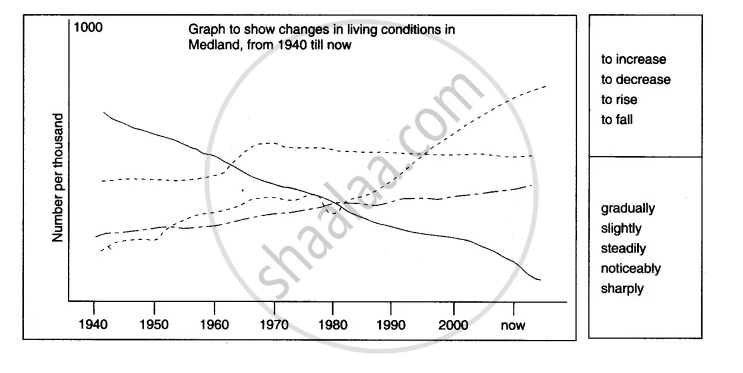Advertisements
Advertisements
प्रश्न
Answer the following questions:
Bicker’ means ‘to quarrel’. Why does the poet use this word here?
उत्तर
When the brook flows out of the place of its birth and flows down, it makes a lot of noise which gives out the idea of noise bom out of ‘a quarrel’. The poet uses the word “bicker” which means ‘to quarrel’. He seems to be using the right word at the right place. The word ‘bicker’ denotes the noisy and quarrelsome sound of the flowing river.
APPEARS IN
संबंधित प्रश्न
Listen to a speech by the honourable former President of India, Dr APJ Abdul Kalam, on his 'Vision for India'. While listening, fill up the following details.
a . The following countries captured our lands and conquered our minds.
-----------------------------------------------------------------------------------------------------------------------
b . His first vision had been that of ---------------
c . His second vision was -----------------------
d . The three scientists who worked with him at ISRO were -------------------------------------------
e . India leads in --------------------------- and is the second largest producer of ----------------------
Have you ever been on a trip to any place in India, where you didn’t know the language spoken locally? How did you feel? How did you manage to communicate?
Identify the rhyme scheme of the poem.
Answer the following question.
With reference to the poem, how can you look after your teeth?
(A) Working in pairs, fill up the table by asking your partner about what he/ she does on the following days and times.
| Day | 7.00 am | 1.00 pm | 6.00 pm |
| Sunday | |||
| Monday | |||
| Tuesday | |||
| Wednesday | |||
| Thursday | |||
| Friday | |||
| Saturday |
(B) Write a brief account of his/her actions on the specified times and days, in the
space below. Ask further questions, if necessary. Use the simple past/past
perfect tense to write your description.
e.g. (a) Rani visited the zoo on Sunday.
(b) She had.finished all her homework by 5. 00 am on that day.
Now write three situations similar to (a) in the box. Exchange the information with your partner and guess the answer to each other's situations as in (b).
Question 1.
My dog is barking angrily and is trying to get loose.
Question 2.
The car is making a curious noise.
Question 3.
Satish enters breathing heavily.
Satish enters breathing heavily.
(4)

Used to and Would
(A) Read the passage given below. Substitute ‘used to’ with ‘would’ wherever appropriate so that the passage reads better.
When I was a student, I used to visit the library frequently. The librarian was a kind man and he used to help me select my books. There used to be a small tea shop near the library. After spending a few hours in the reading room of the library, 1 used to go to this tea shop to meet my friends. There used to be an old waiter who kept a corner table reserved for us.
No. This is because they are used differently.
Read the passage again and complete the sentences below.
1. ‘used to’ is used to describe _______ in the present as well as situations that existed in the past.
2. ‘would’ is used to describe only _______ in the past.
(B) Think of the days when you were eight years old. Write down four or five things you would do or used to do or be. Make sentences like those in the box. Share your experiences with your partner.
Rearrange the following words and phrases to form meaningful sentences. The first one has been done as an example:
other species/ human species/the/of/ many/ the/ very existence/ is threatening.
The human species is threatening the very existence of many other species.
(a) of nature/biodiversity/the/is/variety of life forms/interact to support/ that/ and sustain/ balance/ the ____________________________________
(b) consumed/as/grows,/ more and more of / Earth’s/ the / resources/ are/ human population/the
____________________________________
(c) extinction/ crisis / explosive/ an/ consumption / had led / growth and / an ____________________________________
(d) that have/ Earth’s history/ mass extinctions / the/ threatens/ periodically during/ occurred/ the/and to surpass
(e) one everyday/ scientists/ that/ estimate/ rate off species are disappearing/ the / at
____________________________________
The table below provides you with a list of modals that are used to express necessity and permission.
| Necessity I obligation | Permission |
|
Positive must obeying have to authority need to ought to right thing should to do |
Positive can (less formal) may (more formal)
|
|
Negative must not cannot ought not to |
Negative need not do not have to
|
On the basis of your reading of the extract, tick mark the most appropriate meaning for the given word :
(i) Infatuated (Para 1}
• fond
• influenced
• disliked
• addicted
(ii) Melancholy (Para 2)
• happy
• sad
• worried
• disappointed
(iii) Petrified (Para 6}
• horrified
• motionless
• stunned
• anxious
(iv) Gravity (Para 7}
• mischievous
• seriousness
• joyfulness
• greatness
